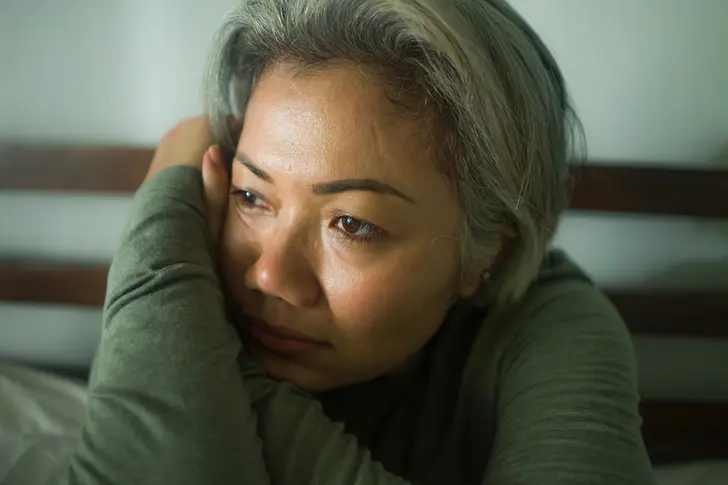- Overview
- Symptoms
- Risks, Prevention & Screening
- Tests & Diagnosis
- Types
- Your Breast Cancer Care Team
- Treatment
- Living With Breast Cancer
- Remission & Recurrence
- Advanced Breast Cancer
- Support & Resources
- Appointment Prep
- View Full Guide
Managing the Anxiety of a Breast Cancer Diagnosis



Breast Cancer and Anxiety
It’s natural for a breast cancer diagnosis to cause you anxiety. You might feel anxious about your treatment, prognosis, and how your life will change. Even after you’re finished with treatment, you may worry your cancer might come back. There are steps you can take to help manage this anxiety.

Find the Right Doctor for You
Choose a doctor you can connect with easily. You want someone who is both accessible and understandable. Do they offer telehealth, a direct number, or a patient portal so you can reach them when you have concerns? What’s their communication style? Maybe you want an oncologist who gives it to you straight – the good, the bad and the ugly. Or maybe you need someone who takes the time to answer your questions thoroughly, looks you in the eyes, and makes you feel at ease.

Get to Know Your Care Team
Cancer care is about more than treating cancer cells. Many cancer centers have social workers, psychologists, psychiatrists, and spiritual advisors to help with the emotional and mental strain of a cancer diagnosis. A patient navigator can help ease the stress of coordinating complex care. A palliative care specialist might offer medication or complementary therapy to relieve your anxiety.

Know What to Expect
It can be emotionally taxing to visit the doctor expecting results of a scan only to learn that isn’t the purpose of the appointment. Likewise, hard news may hit even harder if you haven’t prepared yourself for it. Talk to a patient navigator about how you can best prepare for each visit to go in ready and keep anxiety lower.

Get on-the-Spot Answers
Waiting days for mammogram results can cause major anxiety. Some mammogram centers will discuss the results of your mammogram as soon as it’s complete. If this would make your diagnosis and treatment easier for you, look for a clinic that operates this way.

Lay Low Before Treatment and Scans
Chemotherapy, surgery, and follow-up scans can be a primary source of anxiety for many women. They can also be extremely tiring. Save your energy and inner peace by planning to lay low on the day of treatment or a scan and in the days leading up to it. Don’t plan to take care of other stressful household or family responsibilities on the days when you have chemo or a mammogram.

Use Your Support System
People who have not been through a cancer diagnosis and treatment don’t know what you need. But they will likely do anything you ask. If you need a shoulder to cry on or someone to take over a few chores to alleviate stress, ask. Many of your friends and family will deliver, and you will find comfort in knowing they are there for you.

Set Boundaries
Well-meaning friends and family can sometimes be clumsy in their attempts to comfort you. They may brush off your concerns and insist everything will be OK when you’re seeking a listening ear, or they may share stories from others you’d rather not hear. Let your loved ones know what feels supportive and what doesn’t so they can help you in the ways you need.

Join a Support Group
Sharing personal information with others might not be for you. But many people find great comfort connecting with other women in the same situation. It can be a very effective way to reduce stress and anxiety. You can find support groups in person and online. Search the internet and ask your care team.

Complementary and Alternative Therapies
Meditation, yoga, tai chi, deep breathing, creative visualization, massage, acupuncture, and aromatherapy are just a few practices that might help relieve stress and anxiety. Your health care facility may offer some of these, or you can find them on your own.

Talk Therapy
A therapist may be able to provide more effective tools for coping with ongoing anxiety. One type of therapy, called cognitive behavioral therapy (CBT), can help you change patterns in your thoughts and behavior that might be hurting you emotionally. Ask your care team for a referral.

Medication
If anxiety is taking a toll on your quality of life or leaving you unable to complete day-to-day tasks, medication may help. Tell your doctor what you are feeling and what you have tried so far, and ask whether anti-anxiety medications might be right for you.
IMAGES PROVIDED BY:
1) iStock / Getty Images
2) DigitalVision / Getty Images
3) Moment / Getty Images
4) E+ / Getty Images
5) E+ / Getty Images
6) DigitalVision / Getty Images
7) E+ / Getty Images
8) iStock / Getty Images
9) E+ Getty Images
10) Brand X Pictures / Getty Images
11) Moment / Getty Images
12) iStock / Getty Images
SOURCES:
American Cancer Society: “Choosing a Cancer Doctor.”
CancerCare: “Your Health Care Team: Understanding Their Roles.”
Breast Cancer Now: “What Happens at a Breast Clinic Appointment,” “Stress and Anxiety After a Breast Cancer Diagnosis.”
Breast Cancer: “Getting Your Test Results.”
MD Anderson: “10 Things to Avoid While Receiving Chemotherapy.”
Touro LCMC Health: “Why a cancer support system is an important part of a treatment plan.”
Cervivor: “The Power of Setting Boundaries.”
National Breast Cancer Foundation: “Breast Cancer Support Group.”
Living Beyond Breast Cancer: “Medicines for Anxiety.”